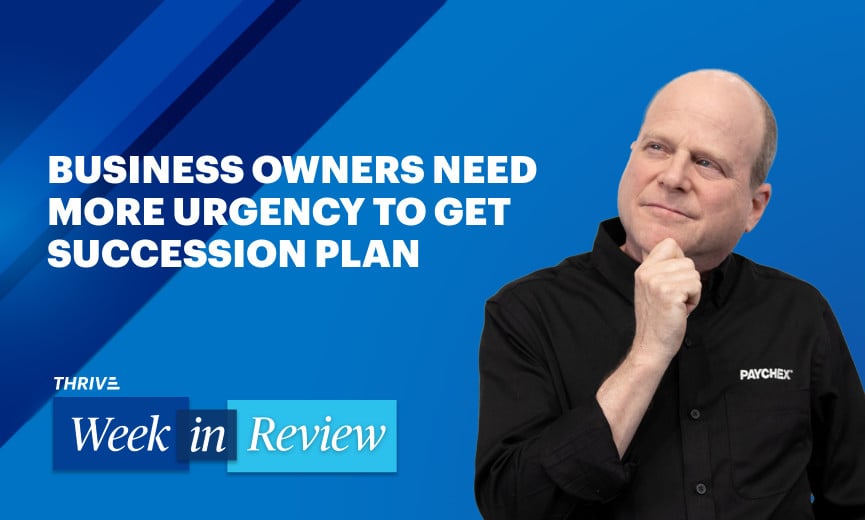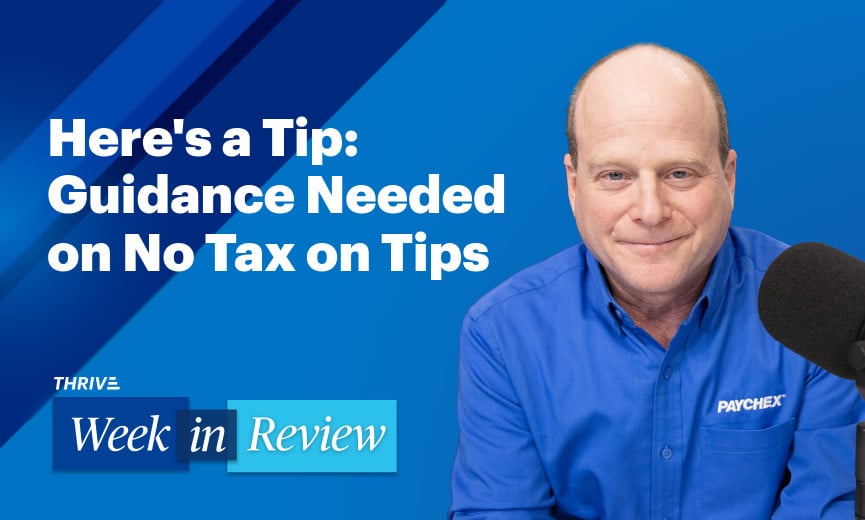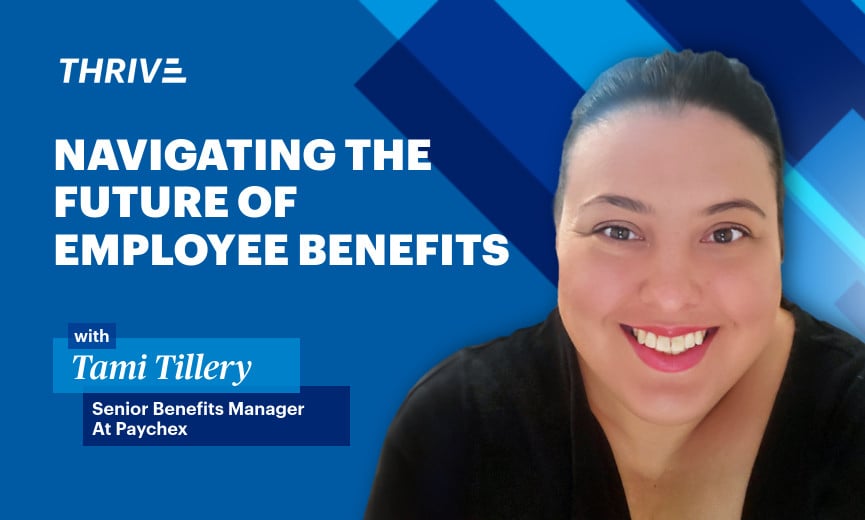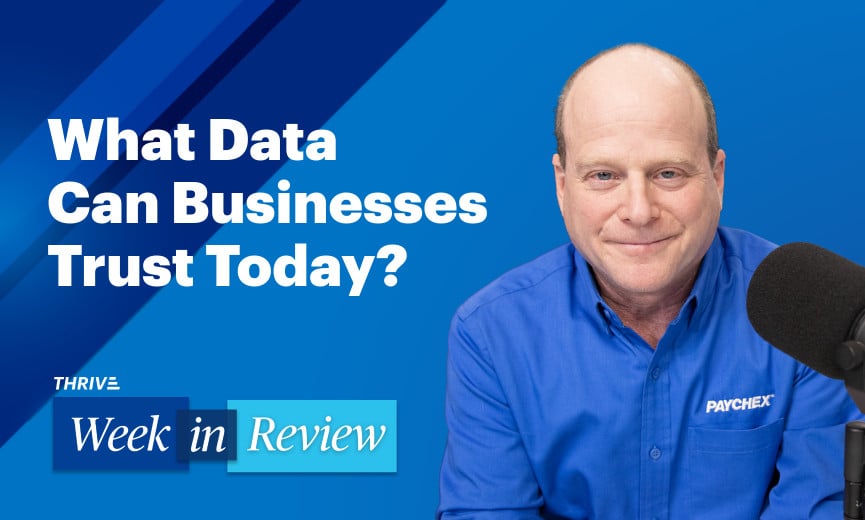- Thrive
-
Season
4Episode22
The Journey to a Better Workplace: The Strategic Role of HR
Podcast •
Watch
Summary
What if your tedious tasks disappeared and you could build a dream work environment for both you and your employees? Our guest for this episode of Paychex PULSE, Jeff Williams challenges listeners to do just that through the lens of our findings from the 7th Annual Pulse of HR Report. Tune in to hear Jeff provide the insights, direction, and much needed motivation to jumpstart your HR strategy, while still keeping what matters most at the forefront — your people.
Download the 7th Annual Pulse of HR Report to read more about what’s on the minds of U.S. business and HR leaders.
Topics include:
00:00 – Welcome Jeff Williams
00:57 – Pulse of HR takeaways
02:21 – Emerging HR trends from the Pulse of HR
03:35 – Payroll as an employee engagement tool
05:46 – Alternate pay methods and compliance
06:56 – The use of AI in HR
09:48 – HR professionals as strategists
11:03 – Optimizing hybrid work for employees and employers
14:52 – Creating a more intentional HR mindset
16:03 – Jeff’s final piece advice for HR professionals
16:53 – Wrap up
For more insights into the Pulse of HR, watch our webinar with the researchers behind the report.
Ready to implement an employee engagement strategy that meets the needs of your workforce? Start here.
Discover the right Paychex solution to help support your big HR goals.
View Transcript
Rob Parsons (00:03)
Welcome to Season 4 of Paychex PULSE, an HR podcast where HR professionals can find great insights on today's top issues and be inspired to build and lead effective teams in a healthier workplace.
Rob Parsons (00:19)
Hi everyone, I'm Rob Parsons, and I'd like to welcome you to the Paychex PULSE podcast. This is another episode where we're going be talking about our Pulse of HR research, the seventh annual for 2023. Joining me today is Jeff Williams, and he's our Vice President of Enterprise and HRO Services. Jeff leads the teams that provide proactive advisory services to clients looking to navigate complex legislation and evolving employee landscape. Jeff, welcome to the podcast.
Jeff Williams (00:50)
Glad to be here. Just don't make me say "PULSE podcast," three times in a row quickly.
Rob Parsons (00:54)
There's a lot of alliteration there, isn't there? So, as I mentioned, Jeff, this is our seventh annual Pulse of HR study.
Jeff Williams (01:01)
Yes.
Rob Parsons (01:03)
As you looked at it from the perspective of an HR professional, what were your key takeaways?
Jeff Williams (01:08)
I think, probably, a few things for me. One is, it's a good annual reminder that it's always all about the people. I think regardless of what industry you're in, or what you're trying to accomplish, you do that via great people. If you're running a hospitality business, you need people delivering great service. If you're running a professional services company, you better have good people that know data science. If you're fixing cars, man, those things are electronic and computer things running on wheels. So, you better have people that know how to do that. I'm constantly reminded of the importance of people, to business outcomes. They are inextricably linked.
Rob Parsons (01:47)
That's such a great insight. And sometimes we forget. We truly are in the people business.
Jeff Williams (01:52)
And we really are. And you think about just people in work, in post-COVID era, and the way that continues to evolve, and we see it coming out in the survey. We see the importance of technology. We see people wrestling with items around the new work location. We see evolving changes around gig economies, and those sorts of things. There's just a lot happening in the people spectrum, and we're excited to be a part of it.
Rob Parsons (02:22)
Was there anything surprising to you? You know, you're out there, your people are out there, you're in the field, you see what's going on. Was there anything surprising, or was it really just confirming some of the things you've been seeing?
Jeff Williams (02:33)
Yeah, maybe not surprising, it, just, maybe confirming of some trends we're seeing that are coming alive. I'll give you a couple of examples. One thing that's coming alive is the increasing reality of DEI efforts in the workplace. So, areas around pay transparency, pay equity, inclusion, employee resource groups, all these sorts of things that really support bringing DEI to life in the workplace. I think companies are getting much more intentional in that, and it showed in the results. I also think that some non-traditional benefits are really starting to increase in importance. So, think about things like shorter work weeks, more work flexibility, what exactly is my work location? What about voluntary benefits? Can I get pet insurance? What about new pay types? Can I get my pay on a card? All of these things are evolving, and we see it intuitively, but it's coming out in the research, and the data as well.
Rob Parsons (03:36)
I love that you mentioned pay, because that was something I found very interesting, and last year we were at HR Tech together.
Jeff Williams (03:42)
Yeah.
Rob Parsons (03:43)
Everybody was talking about employee experience, employee experience. It was interesting to see pay options come into play as how people are thinking about the employee experience, pay on demand, pay cards, pay transparency.
Jeff Williams (03:56)
Yes.
Rob Parsons (03:57)
Can you talk a little bit about that? What's happening in the world of payroll? It's really not, it's not a commodity anymore.
Jeff Williams (04:01)
It sure isn't. And I think context is good when we get onto this topic. So, think about it, you've got this really high inflation environment, you've got a fairly indebted workforce. I mean, we've seen that statistic come out, that 40 percent of the American population would struggle to come up with four or five hundred dollars in an emergency. You see increasingly high interest, short-term loans for those people that do need access to their cash. And in general, you just see more immediacy in the workforce between the work, and a desire to be rewarded for, and connected to their pay. So, what we're, with that backdrop, what we're really seeing is organizations who are declaring more intent to do more frequent pay, either via card, or via some other mechanism, and the intent numbers are pretty breathtaking. We're seeing 60, 70 percent of organizations say, "We want to pay on some sort of pay card type product." Let's just use that as a working title. And, if you think about it for the employee, the benefit is I have better access, I feel more secure because I don't have to go to these more predatory locations to get access to my money. But think about it for the employer, as well. The employer has, maybe, a calmer employee, maybe a less worried employee, maybe that employee's a little bit more motivated to do that next hour of work, knowing they're going to get paid tonight for it, rather than in a couple of weeks. So, this is one of those that really does appear to have benefits on all sides of it. My other point on this, that I do think it's important to remind folks of is don't forget there's a lot of compliance stuff out there. So, how are you going to take taxes off of it? How are you going to report on it? How are you going to get your accruals right? What happens if the employee leaves before the end of a pay cycle, and you're counting on all these things to true up at the end of it. I really do believe it's important to have a partner with you, that can help you, kind of, work through some of that, help you understand it, while still accomplishing the goal of giving employees better, and more timely access to pay.
Rob Parsons (06:20)
That's a great point. I, as a marketer, I just think of how great it is for bringing employees on.
Jeff Williams (06:25)
Yes.
Rob Parsons (06:26)
Just saying.
Jeff Williams (06:27)
Yes.
Rob Parsons (06:28)
You don't have to front me the company, the owner, you get paid for the work you've done right away. And I just, so I like your little touch there with the compliance issues because it is, payroll is a sticky subject.
Jeff Williams (06:40)
Yeah. There is always going to be legislation relative to pay, and it's just important to make sure you're doing it effectively, and doing it right, and deducting it right. And, reporting it correctly, and companies like ours, can really help you navigate that.
Rob Parsons (06:55)
For sure. Another area, and I've wanted to check the stat here, another area I wanted to look at was AI. More than 75 percent of HR leaders at companies with 20+ employees plan to use AI, artificial intelligence, in the next 12 months. That's 75 percent…
Jeff Williams (07:10)
Yes.
Rob Parsons (07:11)
In the next 12 months.
Jeff Williams (07:11)
Yes.
Rob Parsons (07:13)
That's a huge leap from what we saw at HR Tech last year.
Jeff Williams (07:17)
It really is a big number, and little do our listeners know, I'm actually a robot. I'm just kidding. Yeah, and we think it has a place in the near-term HR office. You know, think about it. There are areas where we can readily leverage AI today, to answer common questions, to democratize information, to make sure that both the employee and the employer are working from the same song sheet, of what is HR policy, what is HR process. Like, I think all of that is ready for the shop floor today. We can ask AI to do a tip calculation for us in California on overtime if we work in the hospitality sector. You could get a pretty good answer from Chat GPT on that very question. So, I would say continue on, figure out what that layer of commoditized information is, and press into that. As an HR leader, I think it's important to continue your journey on that one, and we're certainly going to continue ours. What I would say is it's a blend of man and machine. So, it is important if you think about, is AI going to give you the answer to "Hey, Joe's had his hand in the till for the third time in the last six months, and he's now on a medical leave. Can I terminate Joe?" Like, AI is not going to spit out that answer for you. Like, you still do need the help and consultation of a professional. But I think the mirroring of the skill, of the practitioner, with the increasingly easy-to-use abilities that come from AI, I think it's just a more powerful combination. And I'm, you know, personally, I'm not one that worries a lot about job substitution for AI. I mean, if you look at the invention of the spreadsheet, that was going to be the death of the accountant and we see that more people are employed in accounting, than at the invention of Excel. So, I think there's a wonderful marriage there, between what AI is, and is going to be capable of, and maybe allowing that HR practitioner to become even more strategic in what they do every day, being complimented by this technology.
Rob Parsons (09:37)
Which is so much of what we've been talking about, free yourself up, let someone else, or something else, take care of the admin, so you can focus on the things that are really important.
Jeff Williams (09:47)
Yes. Yeah. And, if you look at the HR, as strategist continuum, you know, Stacey Harris, who does really good work over at Sapient…
Rob Parsons (10:00)
Mhm.
Jeff Williams (10:01)
You know, she would say that, you know, the HR as strategist has stalled a little bit. So, what are we seeing there? Chief HR Officers aren't necessarily raising their profile as quickly in the boardroom as we would think, given how important people is to strategy, and what's stopping that? What's stopping it is the point you raise, which is sometimes you get a little bit too caught up in the transactions, sometimes we're busy playing fetch for information. "Oh, where am I? What's your turnover?" "What's the pay situation in a certain group?" "What's your comp ratio?" "How many people are turning over in our Des Moines office?" You end up doing things on behalf of your business partners instead of having the information readily available, and then providing the insights, the strategies, and the action plans that go with what you're finding out from the information, rather than going to get it all the time.
Rob Parsons (11:01)
Yes, I love that. And there's an area we saw in the report, and it came out too, we held a webinar on this a few weeks back. We did a live poll, 70 percent of attendees. We had like 600 people attending.
Jeff Williams (11:16)
Yeah.
Rob Parsons (11:17)
Are offering remote or hybrid work. So, it is not, at least despite what I've been reading in the news, not really going away, but, it's still, I don't know that we're good at it yet, which really plays into this more strategic role of an HR leader. How do I get better at it? How do I get my people to be better at it, how do I get managers to be better at it? What do you, what are you seeing and hearing on the hybrid side?
Jeff Williams (11:41)
Yeah, I'd say embrace, embrace your present. So, I think there's a little bit of looking back on what was and maybe thinking about what may be, and who knows, maybe there's a lesson for life in some of that. And rather than being where you are. And I think about maybe stacking up the way you're thinking about your workforce, might be a good idea. And here's a way you might want to think about it: What do you want to be present for in the office? What I think we find is, it's great for doing things like strategic planning, for deep collaboration, for creating bonds with brand, for training. Like, we're seeing all of these areas where, you know being in the office and being together can really matter. And, then it's, "Okay, well maybe I need to compliment that with a remote workforce." Well, what's my "why" on having a remote workforce? It could be access to rare and difficult-to-find skills. It could be widening your aperture to get better recruiting outcomes. It could be because you may need to find regional matches for where your clients are. Like, there are good reasons to have a remote workforce. And then maybe you compliment that with the global workforce, where you get access to very large labor pools, and there is salary arbitrage, and cost savings opportunities. And you can find a pathway to automation. So this, this notion of the workforce of tomorrow I think is the workforce of today. We're finding that our clients, and ourselves, are thinking about the world in a hybrid way. We see that most organizations have some flavor of two to three days back in the office. And I think most organizations are trying to be more intentional, to match being present with business outcomes. In all of that, what I would remind, maybe the listener, to think about is, "Have I built an operating system that accommodates what I'm trying to do, from a location perspective? Or am I trying to appease everyone with my location policy?" For example, "Do I have the right technology to support collaboration in a remote environment?" "Do I have the right measurements to ensure I've got a good handle on productivity in the office versus remotely?" "Do I have leadership rhythms and routines that ensure people are allowed to, and invite connections, that are social in nature, and that create longer-term bonds with the workplace." So, I would say that was a really long answer I just gave you.
Rob Parsons (14:32)
Perfect.
Jeff Williams (14:33)
But I'm excited about the topic.
Rob Parsons (14:34)
Yeah.
Jeff Williams (14:34)
Because I think it's really important to know that those that are really trying to precisely figure out how all of this is going to land, maybe missing the opportunity in this situation, that's right in front of them. Do what's best for your business.
Rob Parsons (14:51)
Right. And you were touching on something so great there, this level of intention on how you want the workplace to work.
Jeff Williams (14:59)
Yes.
Rob Parsons (15:00)
And then, you design the systems, the infrastructure, you get the technology to support that, versus chasing, reacting, or even letting technology dictate what you're doing. That comes into play what you were talking about earlier about the strategic role of HR, and being intentional about the workforce to match up with what the business is trying to get to.
Jeff Williams (15:20)
Yeah, and I think if you always start with your purpose as an organization, like, "What are you there to do?" "Who are you there to serve?" And, "What's the aspiration you're setting forward as an employer?" Like, if you can't frame everything in that stuff, sometimes this location thing will start solving itself for you. If you stick to your "why," always put that up front. What is our "why," and why does it matter where we do our thing? If you start there, the answers start to become more clear. You start to have more conviction, you do less apologizing, and more enlistment of your workforce.
Rob Parsons (16:03)
Love it. This was an absolutely great conversation, Jeff, and I've I am going to have you on the podcast again.
Jeff Williams (16:10)
Please have me back! I'd love to.
Rob Parsons (16:11)
Any last thoughts for our listeners before we wrap up?
Jeff Williams (16:13)
Oh, maybe just a reminder for our listeners that the people stuff is just so critical, and don't compromise your place in the company, leverage it. Whatever we're doing from an HR perspective the more we can harmonize that with what we're doing as a business, the more important the role of HR becomes. So, be that person who knows and understands the economics of HR, and also be the change steward that can carry the rest of the organization with you on your journey to create a better workplace.
Rob Parsons (16:53)
Love it. Great insights, Jeff. Thank you, once again, for joining the podcast.
Jeff Williams (16:56)
Thanks again for having me, Rob. See you soon.
Rob Parsons (16:57)
See you soon. And, we have, for our listeners, if you're interested, we'll have a link to the Pulse of HR survey in our show notes. And I'd like to finish up by just thanking you all for joining, listening today. And, as always, please stay happy and healthy. Be sure to subscribe to this, and our Paychex THRIVE Business Podcast on your favorite podcast platform. Looking for more ways to keep your finger on the pulse of industry dynamics? Visit our resource center for the latest research thought leadership and news at Paychex.com/worx. That's W-O-R-X. Thanks again for joining us. Until next time, please stay happy and healthy.
Announcer (17:40)
This podcast is property of Paychex, Incorporated 2023. All rights reserved.

 Apple Podcast
Apple Podcast Spotify
Spotify iHeartRadio
iHeartRadio









